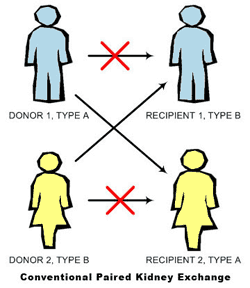Just in case you were wondering what it is we lawyers think about all day, have a look at this article by Villanova Law Professor James Maule.
It seems that a recent trend among transplant surgeons is to arrange "kidney swaps" among couples who are themselves blood-group incompatible.
The scheme works something like this: let's say Stuart and Frank, strangers to each other, each need a kidney. Stuart's wife Sally and Frank's wife Franny are willing donors, but can't give a kidney to their husbands because of blood group mismatches. Franny, however, is the correct blood group for Stuart, and Sally is the correct blood group for Frank. So the transplant program matches up the two couples, sticks Franny's kidney into Stuart and Sally's kidney into Frank, and everyone goes home happy. It's an innovative solution, not without ethical question marks, but a pretty cool idea all around.
Franny, however, is the correct blood group for Stuart, and Sally is the correct blood group for Frank. So the transplant program matches up the two couples, sticks Franny's kidney into Stuart and Sally's kidney into Frank, and everyone goes home happy. It's an innovative solution, not without ethical question marks, but a pretty cool idea all around.
And while the doctors are busy saving lives, what are we lawyers up to? Why nothing less important than figuring out whether the IRS should assess income tax on the exchange!
Indeed, Professor Maule believes the operation should be taxable:
It seems that a recent trend among transplant surgeons is to arrange "kidney swaps" among couples who are themselves blood-group incompatible.
The scheme works something like this: let's say Stuart and Frank, strangers to each other, each need a kidney. Stuart's wife Sally and Frank's wife Franny are willing donors, but can't give a kidney to their husbands because of blood group mismatches.
 Franny, however, is the correct blood group for Stuart, and Sally is the correct blood group for Frank. So the transplant program matches up the two couples, sticks Franny's kidney into Stuart and Sally's kidney into Frank, and everyone goes home happy. It's an innovative solution, not without ethical question marks, but a pretty cool idea all around.
Franny, however, is the correct blood group for Stuart, and Sally is the correct blood group for Frank. So the transplant program matches up the two couples, sticks Franny's kidney into Stuart and Sally's kidney into Frank, and everyone goes home happy. It's an innovative solution, not without ethical question marks, but a pretty cool idea all around.And while the doctors are busy saving lives, what are we lawyers up to? Why nothing less important than figuring out whether the IRS should assess income tax on the exchange!
Indeed, Professor Maule believes the operation should be taxable:
These are not gifts, because each has conditioned donation on getting something in return. Each has a basis of zero in the exchanged kidney. Each has an amount realized equal to the fair market value of a kidney. The like-kind nonrecognition rules do not apply because it's not a trade, business, or investment activity. No other non-recognition provisions are relevant. There's no exclusion applicable to the transaction. The lack of cash is not an obstacle to the taxation of bartered exchanges. . . . There's no charitable contribution deduction because no charity receives the kidneys. The substance over form doctrine treats the exchange as a swap of kidneys between the two women, each then making a gift to her husband.Lest you think tax professors completely heartless, you will be relieved to know that Maule does offer some hope for these patients-cum-entrepreneurs: they should be able to deduct the medical expenses from the transplant! So we can all enjoy Christmas this year after all, as long as we do not forget (as Maule takes care to remind us), that such expenses may be written off only insofar as they exceed 7.5% of adjusted gross income.





I think they should just send the IRS a chunk of kidney.
ReplyDeleteWe do it a bit more easily here at work...the donor kitties get to live it up on drugs for a while, then they go to new homes.
ReplyDeleteThere was a poster for a 'retired donor' kitty the other day, suggesting he was looking for a new home after a long and fruitful career, although I would have really thought it's a job you only do once.